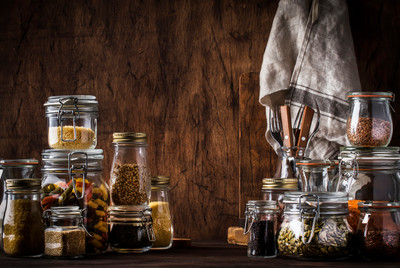Glass - The Original Eco-Friendly Option
Posted by The Wares Team on 15th Nov 2019
We’ve talked a lot recently on the blog about the environment and the ways in
which we can all make changes in our lives that could lessen our impact on the
world we live in. From plastic pollution in our seas to food waste in our own
homes and soaring carbon emissions from the way we live, we are all waking up
to the enormous impact we're having on the planet and slowly starting to see
that we need to take drastic action as soon as we can.
It’s all too easy to assume that any small changes we make on an individual
basis are just a drop in the ocean and too tiny to really make a difference,
but that’s simply not the case. One small plastic drinking straw or cotton bud
hasn’t caused a pollution crisis on its own, but it has as part of a collective
mass. Our own individual actions can’t turn the tide on their own, but they can
as part of a wider movement.
In today’s blog post, we take a look at how using glass more often in our
lives, instead of plastic, can help fight the plastic crisis affecting the
world.
Glass Milk Bottles - A Tiny Step In The Right Direction
Drinking straws and cotton buds have hit the headlines because of their sheer
numbers and single-use, disposable nature. But look around your daily life for
other plastic items that you use on a very regular basis and plastic milk
cartons are likely to be at the top of many people’s lists. We all drink milk
on a daily basis and it’s estimated that the UK buys 5 billion litres of milk
per year, with 80% of that supplied in plastic bottles. That’s an awful lot of
plastic!
Whilst it’s true that most of us now recycle milk bottles through kerbside
recycling schemes, it’s still a huge environmental concern as many bottles will
still end up in landfill and the environmental impact of producing so many
plastic bottles is huge. Whilst the UK’s plastic milk bottles contain up to 40%
recycled material, they still require a lot of virgin plastic.
More and more people are now looking at how they can reduce the amount of
plastic in their lives and this interest has led to a surge in demand for milk
in glass bottles. Unlike plastic, glass can be recycled over and over, which
means that it is ultimately much more environmentally-friendly.
Of course, glass weighs a lot more than plastic and is, therefore, more costly
to transport to its sales destination. As such, it’s a complex issue to weigh
up the pros and cons of buying milk in glass bottles, but if you have a
supplier who uses milk produced from local farms, switching to glass milk
bottles could make a real difference!
Other Ways To Use Glass Instead Of Plastic
Switching to glass milk bottles might be the most obvious way to reduce the
amount of plastic in your household, but there are plenty of other ideas that
are easy to adopt too. Why not make your own tomato ketchup, for example, using
glass bottles designed for sauces? These days, most ketchups are sold in
plastic bottles rather than glass, so that’s another regular purchase that
could be replaced with a more eco-friendly option. And of course, it goes
without saying that your own homemade ketchup is guaranteed to taste so much
nicer than the supermarket-bought version!
If your family gets through a large volume of fruit squash and cordials, try
making your own instead of buying all those plastic bottles. Fruit cordials are
easy to make, store well and taste so much better than store-bought drinks.
Once again, you can use glass bottles instead of plastic. We recommend
swing-top bottles for this kind of project.
You can make cordials out of pretty much any fruits that you have to hand and
when in season, both elderflowers and elderberries make the most heavenly of
cordials that will really get the whole family enthused about the switch to a
more natural, environmentally-friendly alternative.
In addition to glass bottles, you can also use glass jars around the kitchen to
make a difference. If you’ve bought pasta, rice or flour and had to throw some
away because it spilled out of the plastic wrapper in your cupboards or was
spoiled somehow, why not get some large glass containers and use them for storage?
They’re airtight, reusable, easy to clean and they make it easy to see exactly
what’s inside them and how much of any item you have left.
As you can see, once you start looking around the kitchen at what you actually
use on a daily basis, it’s easy to see where small changes could be made and
how those small changes could really mount up over time to make a significant
difference. And if we all adopted those small changes, switching to glass milk
bottles, for example, just imagine how big an impact we could all have.

